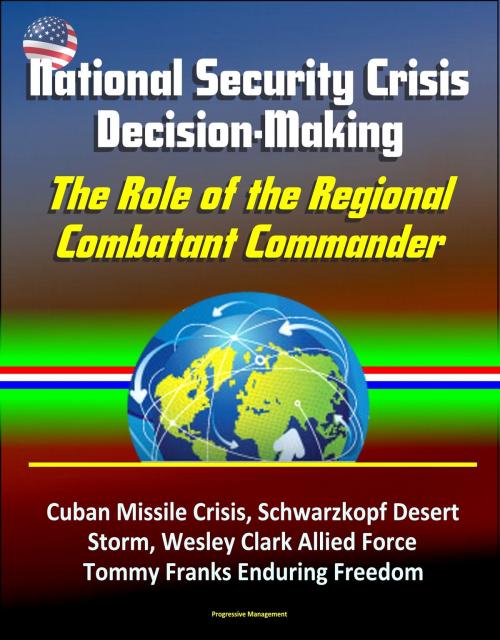National Security Crisis Decision-Making: The Role of the Regional Combatant Commander - Cuban Missile Crisis, Schwarzkopf Desert Storm, Wesley Clark Allied Force, Tommy Franks Enduring Freedom
Nonfiction, History, Military, Strategy| Author: | Progressive Management | ISBN: | 9781310690747 |
| Publisher: | Progressive Management | Publication: | March 8, 2016 |
| Imprint: | Smashwords Edition | Language: | English |
| Author: | Progressive Management |
| ISBN: | 9781310690747 |
| Publisher: | Progressive Management |
| Publication: | March 8, 2016 |
| Imprint: | Smashwords Edition |
| Language: | English |
Professionally converted for accurate flowing-text e-book format reproduction, this study examines the role of the regional combatant commanders (CCDR) during complex contingencies. The successful management of the Cuban Missile Crisis of 1962 set an unfortunate precedent for crisis management and national security crisis decision-making that persists into the contemporary security environment. The Cold War norm, roughly translated, meant that crisis management equaled crisis mitigation. The problem today is that the security environment has changed. Crisis management in the new environment should consider the use of crisis conditions to further the nation's security interests. The US has implemented formal changes to the structure of national security decision-making. Through the Goldwater-Nichols Department of Defense Reorganization Act of 1986 (GNA), the Congress sought to reorganize the defense establishment to provide for better military advice to civilian leaders and also to enable better operational execution during complex and fast-moving national security contingencies. The GNA expanded the authority of the regional combatant commanders (CCDR) and charged the CCDRs with the maintenance of security in their region. Finally, the informal roles and relationships between the civilian and uniformed leadership that change with new presidential administrations often influence the decision-making process and policy formulation. Despite these changes, few scholars or policy makers have considered the role of the CCDR during complex contingencies.
Defining Crisis and Crisis Management * Formal Role of the CCDR during National Security Crises * Case Studies: 3 National Security Crises * GEN H. Norman Schwarzkopf (1990): Operation DESERT SHIELD/DESERT STORM * GEN Wesley Clark (1999): Operation ALLIED FORCE * GEN Tommy Franks (2001): Operation ENDURING FREEDOM * Conclusion * Appendix A (Acronyms) * Bibliography
To discern a new norm for crisis decision-making and civil-military interaction, the study considered all of these changes. An initial examination of the existing crisis and crisis management definitions made it possible to project the new requirements for the contemporary security environment. Subsequent analysis of the CCDR's formal role in the decision-making process and a critical review of three recent military interventions (Operations DESERT SHIELD/DESERT STORM, ALLIED FORCE, and ENDURING FREEDOM) enabled a comparison of actual crisis behavior with the predefined crisis management norms and the evolving role of the CCDR. The comparison revealed that capabilities were not used and policy matters were overlooked because the CCDR either did not engage effectively or his advice was not considered. Nevertheless, the regional commander remained responsible for long-term security achievement of US objectives in his geographical region. The final analysis revealed that the politicians acted as if there were no changes to the environment or the roles of the uniformed military and the CCDRs did not fully understand their new role as a participant in the policy formulation process. The combined failures of the national security leadership allowed conflict conditions to persist long after the crisis response.
The national security decision-making process ought to pay closer attention to the military advice of the regional CCDRs. Interagency planning and management efforts must include military advice in the decision-making process and/or policy formulation. CCDRs must be more aware of political considerations and willing to take part in the political discussion. Finally, the study suggested that formal changes in the decision-making process will not change the informal roles or relationships of the major players. The President makes decisions regarding national security according to his own personal preferences and management style.
Professionally converted for accurate flowing-text e-book format reproduction, this study examines the role of the regional combatant commanders (CCDR) during complex contingencies. The successful management of the Cuban Missile Crisis of 1962 set an unfortunate precedent for crisis management and national security crisis decision-making that persists into the contemporary security environment. The Cold War norm, roughly translated, meant that crisis management equaled crisis mitigation. The problem today is that the security environment has changed. Crisis management in the new environment should consider the use of crisis conditions to further the nation's security interests. The US has implemented formal changes to the structure of national security decision-making. Through the Goldwater-Nichols Department of Defense Reorganization Act of 1986 (GNA), the Congress sought to reorganize the defense establishment to provide for better military advice to civilian leaders and also to enable better operational execution during complex and fast-moving national security contingencies. The GNA expanded the authority of the regional combatant commanders (CCDR) and charged the CCDRs with the maintenance of security in their region. Finally, the informal roles and relationships between the civilian and uniformed leadership that change with new presidential administrations often influence the decision-making process and policy formulation. Despite these changes, few scholars or policy makers have considered the role of the CCDR during complex contingencies.
Defining Crisis and Crisis Management * Formal Role of the CCDR during National Security Crises * Case Studies: 3 National Security Crises * GEN H. Norman Schwarzkopf (1990): Operation DESERT SHIELD/DESERT STORM * GEN Wesley Clark (1999): Operation ALLIED FORCE * GEN Tommy Franks (2001): Operation ENDURING FREEDOM * Conclusion * Appendix A (Acronyms) * Bibliography
To discern a new norm for crisis decision-making and civil-military interaction, the study considered all of these changes. An initial examination of the existing crisis and crisis management definitions made it possible to project the new requirements for the contemporary security environment. Subsequent analysis of the CCDR's formal role in the decision-making process and a critical review of three recent military interventions (Operations DESERT SHIELD/DESERT STORM, ALLIED FORCE, and ENDURING FREEDOM) enabled a comparison of actual crisis behavior with the predefined crisis management norms and the evolving role of the CCDR. The comparison revealed that capabilities were not used and policy matters were overlooked because the CCDR either did not engage effectively or his advice was not considered. Nevertheless, the regional commander remained responsible for long-term security achievement of US objectives in his geographical region. The final analysis revealed that the politicians acted as if there were no changes to the environment or the roles of the uniformed military and the CCDRs did not fully understand their new role as a participant in the policy formulation process. The combined failures of the national security leadership allowed conflict conditions to persist long after the crisis response.
The national security decision-making process ought to pay closer attention to the military advice of the regional CCDRs. Interagency planning and management efforts must include military advice in the decision-making process and/or policy formulation. CCDRs must be more aware of political considerations and willing to take part in the political discussion. Finally, the study suggested that formal changes in the decision-making process will not change the informal roles or relationships of the major players. The President makes decisions regarding national security according to his own personal preferences and management style.















